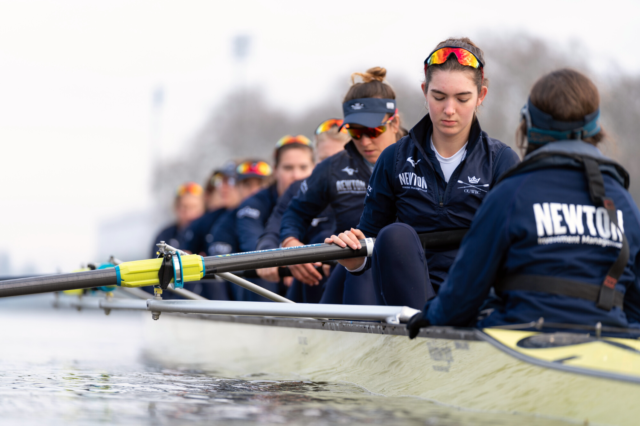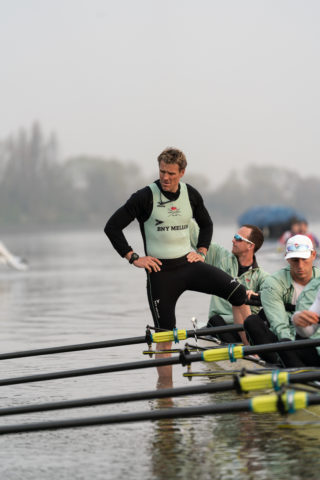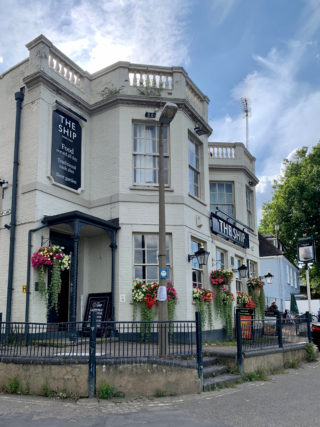The Oxford and Cambridge Boat Race is a historic rowing event which is broadcast to millions around the world. Find out everything you need know and the best places to watch it

Watch the historic boat race © Shutterstock
Along with the dawn chorus and sunny rows of daffodils, there is another unmistakable sign of spring: the annual Oxford and Cambridge Boat Race (26 Mar). Every year, thousands of spectators line the banks of the River Thames to watch this historic rowing race, which is also broadcast to millions around the world – not bad for an amateur sporting fixture with not a football in sight!
The first Oxford and Cambridge Boat Race was held in June 1829 and has taken place every year since 1856, bar two world wars and the pandemic. The first race came about when two childhood friends, one from Cambridge University, the other an Oxford student, challenged themselves to a boat race in Henley-on-Thames (this riverside town in Oxfordshire is particularly pretty in spring and well worth a day trip).
The Oxford-Cambridge route later moved downstream to London and now covers a four-mile stretch of the River Thames between Putney and Mortlake. The official start and finish lines are marked by granite stones on the south bank of the river. They have UBR etched on them (for University Boat Race) so see if you can spot them on the towpath.
What to expect
This year, the 168th Men’s Race sets off upstream from Putney at 5pm, and the 77th Women’s Race at 4pm. The atmosphere at this quintessentially British event builds up all day though, so it’s a good idea to get there early to grab your spectating spot on the riverbank or find a restaurant or pub from which to enjoy the action. Early birds can watch the ‘Coin Toss’, which decides the side, or station, of the river each crew will start from, and takes place in the morning.
There are many spots along the route, which is in a particularly picturesque part of London lined with weeping willows and elegant Georgian buildings. But if you want to be there from the beginning, stay around Putney Bridge. The Duke’s Head has wonderful riverside views and even a basement cocktail bar aptly called The Rowing Club. This popular pub serves traditional British dishes with an emphasis on pickled, salted and cured ingredients, and its Sunday roasts are a must.

James Cracknell, Olympic Gold Medalist, training for the race with the Cambridge Blue Boat, pictured in 2019 © Shutterstock

The Ship in Mortlake © Shutterstock
Catch the action
If you prefer to watch the winners cross the finish line, the Ship at Mortlake, with its nautical white and navy-blue exterior and a beer garden, is ideal. Built in 1781, this grand riverside pub serves fabulous roasts as well as interesting vegan and gluten-free options. You could even make a day of the Boat Race and stay for the free quiz night, which starts at 7.15pm.
Look out, too, for family-friendly Fan Parks in Bishops Park in Fulham and Furnival Gardens in Hammersmith, where you can watch live BBC TV coverage of the race on big screens and grab some street food and a beer while you’re there.
Bear in mind that the average time it takes to complete the course is a swift 20 minutes, though Cambridge (who wear light blue) holds the record for the fastest time of 16 minutes and 19 seconds, achieved in 1998. Cambridge lead overall in the competition too, with 85 victories to Oxford’s 81. Oxford (in dark blue) will hope to narrow the gap with a win this spring. Whichever crew you cheer on, though, make sure you are dressed for the weather, as it can get chilly beside the water.
The weekend before the famous Oxford-Cambridge Boat race is the lesser-known Head of the River Race (18 Mar), which takes place along the same stretch of the Thames but in reverse, starting at Mortlake and finishing in Putney. This processional race, where around 400 crews of eight start in 10-second intervals, is a spectacular sight as the water becomes a sea of boats. First held in 1926, the contest has grown and grown and now has overseas crews from as far afield as Australia taking part. The race itself starts at 1pm and lasts for around two hours, though expect to see the first crew cross the finishing line within 20 minutes. The quickest crew will be the overall winner.


